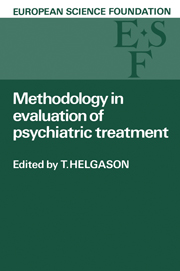 Methodology in Evaluation of Psychiatric Treatment
Methodology in Evaluation of Psychiatric Treatment Book contents
- Frontmatter
- Contents
- Participants
- Foreword
- Preface
- INTRODUCTION
- Evaluation of Psychiatric Treatment
- The Aims of Psychiatric Treatment
- Evaluation in Mental Health Programmes
- I METHODS OF CLASSIFICATION
- II EVALUATION CRITERIA
- III RATING METHODS IN EVALUATION OF TREATMENT
- IV OTHER QUANTITATIVE METHODS OFEVALUATION OF TREATMENT
- V ETHICALAND PRACTICAL PROBLEMS
- Index
The Aims of Psychiatric Treatment
from INTRODUCTION
- Frontmatter
- Contents
- Participants
- Foreword
- Preface
- INTRODUCTION
- Evaluation of Psychiatric Treatment
- The Aims of Psychiatric Treatment
- Evaluation in Mental Health Programmes
- I METHODS OF CLASSIFICATION
- II EVALUATION CRITERIA
- III RATING METHODS IN EVALUATION OF TREATMENT
- IV OTHER QUANTITATIVE METHODS OFEVALUATION OF TREATMENT
- V ETHICALAND PRACTICAL PROBLEMS
- Index
Summary
The scope and limitations of psychiatric treatment
It is as well to examine both the scope and limitations of psychiatric treatment at the outset. The precepts in the constitution of the World Health Organization implicitly define the scope and purposes of health care in the following terms. “Health is a state of complete physical, mental and social well-being, and not merely the absence of disease or infirmity.” The 1958 definition of ‘health’ aspires even higher. “Health means more than freedom from disease, freedom from pain, freedom from untimely death. It means optimum physical, mental and social efficiency and well-being.”
In the attempts that have been made to define positive mental health, concepts such as ‘ego strength’, ‘autonomy’, ‘individuation’, ‘positive self attitudes', ‘integration', ‘self-actualization’ and ‘perception of reality’ have been employed by different authors (Jahoda 1958). This implies that there is some state of mental strength and integrity that can render individuals invulnerable to all forms of mental disorder whether it be schizophrenia, alcoholism, sadomasochistic sexuality, manic-depressive illness, anorexia nervosa, obsessional neurosis or senile dementia. If such a psychic state existed or could be envisaged, it might be regarded as the obverse of mental illness. However, insofar as knowledge has been acquired about their genetical and environmental antecedents, mental disorders differ from each other with little or nothing common to them. There is no foreseeable advance in knowledge that could provide the basis for the prevention of all mental disorders, nor any optimal state of mental well-being that could be expected to define the ultimate goal and end-point of all psychiatric treatment. Aims have to be setin distinct, specific and limited terms for each kind of psychiatric disorder.
Although there have been significant advances in the treatment of a number of forms of psychiatric disorder and some success in the prevention of relapse in some forms of illness, this is far from complete and predictions regarding the degree of control likely to be achieved in an individual case are far from reliable. The most serious forms of psychiatric disorder are liable to recur, to leave residual deficits, to become chronic or to be characterized in all these ways despite the improved methods of treatment available. Aims have, therefore, to be set for care over relatively long periods of time.
- Type
- Chapter
- Information
- Methodology in Evaluation of Psychiatric TreatmentProceedings of a Workshop Held in Vienna 10–13 June 1981, pp. 33 - 58Publisher: Cambridge University PressPrint publication year: 1983


